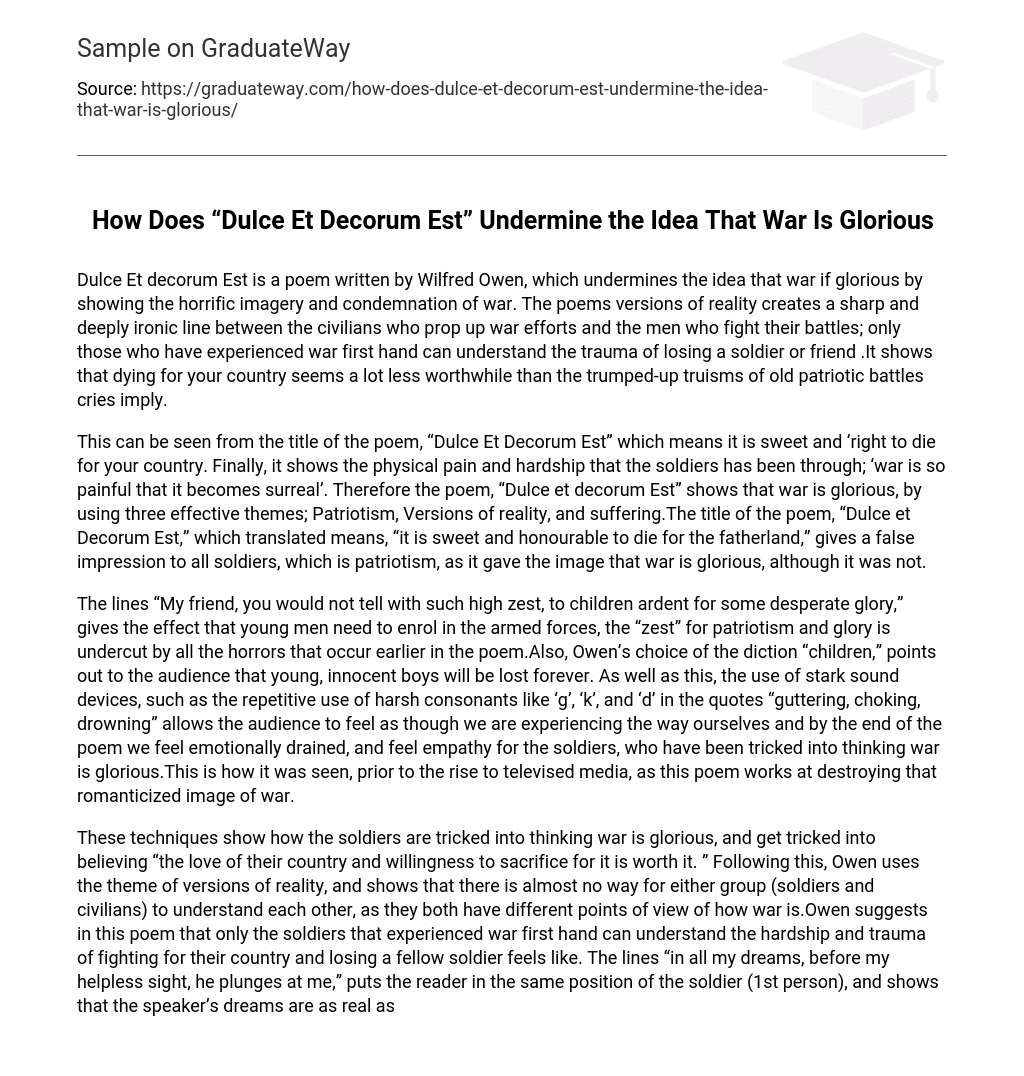Dulce Et decorum Est is a poem written by Wilfred Owen, which undermines the idea that war if glorious by showing the horrific imagery and condemnation of war. The poems versions of reality creates a sharp and deeply ironic line between the civilians who prop up war efforts and the men who fight their battles; only those who have experienced war first hand can understand the trauma of losing a soldier or friend .It shows that dying for your country seems a lot less worthwhile than the trumped-up truisms of old patriotic battles cries imply.
This can be seen from the title of the poem, “Dulce Et Decorum Est” which means it is sweet and ‘right to die for your country. Finally, it shows the physical pain and hardship that the soldiers has been through; ‘war is so painful that it becomes surreal’. Therefore the poem, “Dulce et decorum Est” shows that war is glorious, by using three effective themes; Patriotism, Versions of reality, and suffering.The title of the poem, “Dulce et Decorum Est,” which translated means, “it is sweet and honourable to die for the fatherland,” gives a false impression to all soldiers, which is patriotism, as it gave the image that war is glorious, although it was not.
The lines “My friend, you would not tell with such high zest, to children ardent for some desperate glory,” gives the effect that young men need to enrol in the armed forces, the “zest” for patriotism and glory is undercut by all the horrors that occur earlier in the poem.Also, Owen’s choice of the diction “children,” points out to the audience that young, innocent boys will be lost forever. As well as this, the use of stark sound devices, such as the repetitive use of harsh consonants like ‘g’, ‘k’, and ‘d’ in the quotes “guttering, choking, drowning” allows the audience to feel as though we are experiencing the way ourselves and by the end of the poem we feel emotionally drained, and feel empathy for the soldiers, who have been tricked into thinking war is glorious.This is how it was seen, prior to the rise to televised media, as this poem works at destroying that romanticized image of war.
These techniques show how the soldiers are tricked into thinking war is glorious, and get tricked into believing “the love of their country and willingness to sacrifice for it is worth it. ” Following this, Owen uses the theme of versions of reality, and shows that there is almost no way for either group (soldiers and civilians) to understand each other, as they both have different points of view of how war is.Owen suggests in this poem that only the soldiers that experienced war first hand can understand the hardship and trauma of fighting for their country and losing a fellow soldier feels like. The lines “in all my dreams, before my helpless sight, he plunges at me,” puts the reader in the same position of the soldier (1st person), and shows that the speaker’s dreams are as real as his waking experience; the war becomes more of a mental battle.
As well as this the first two lines, “Bent double, like old beggars under sacks” creates two similes; the soldiers are ‘like’ ‘old’ ‘beggars’ and ‘hags,’ which Owen suggests that their reality is so surreal that he needs to find comparative ways to describe it so that the readers can understand how gruesome his experience has been. Therefore, the use of reality in Dulce Et Decorum Est creates a sharp and deeply ironic line between the civilians who prop up war efforts, and the men who fight their battle, thus being glorious towards war.Finally, the use of suffering, the physical pain and psychological trauma shows the audience how much these boys have suffered, and were tricked into believing that it is sweet and right to die for your country. The first lines of the poem, “bent double like old beggars under sacks, knock-kneed, coughing like hags, we cursed through sludge,” shows that these young soldiers are twisted and contorted, making their experience seem completely different from the sorts of marching that we usually see in military parades.
The second part of the quote is alliteration, and imitates the coughing sound that soldiers make (‘K’ sound). The white eyes writhing in his face,” shows that the man is almost inhuman, as if the physical effects of gassing can transform his body into a version of hell on earth; his very face begins to melt of him. This metaphor emphasises the pain and agony of the soldiers, and shows how war is not glorious, but merely hell. This is backed up by the lines, “in all my dreams, before my helpless sight, he plunges at me, guttering, choking, drowning.
” As well as using harsh consonants (Ck sound), it puts the reader into the soldiers shoes, as it shifts from past to present tense.This shows that the image of horror will never go away, which makes the suffering of wartime casualties never ending. Overall, the poem, Dulce Et Decorum Est uses many themes to portray that war glorious, although it is not. Patriotism plays an important part, as it gives a false impression to all the soldiers who enrolled to fight for their country, as they think that “it is sweet and honourable to die for the fatherland,” however; they are tricked into believing this, and as a result, have suffered for the rest of their life.
Owen uses young soldiers who have still come from school; innocent little men, who haven’t even been married, to show that war is glorious and that it is sweet and glorious to die for your country. Owen shows this by putting the reader into the soldiers perspective, and illustrates that only the soldier himself can understand the trauma of losing a fellow soldier. The old Lie: Dulce et decorum est





